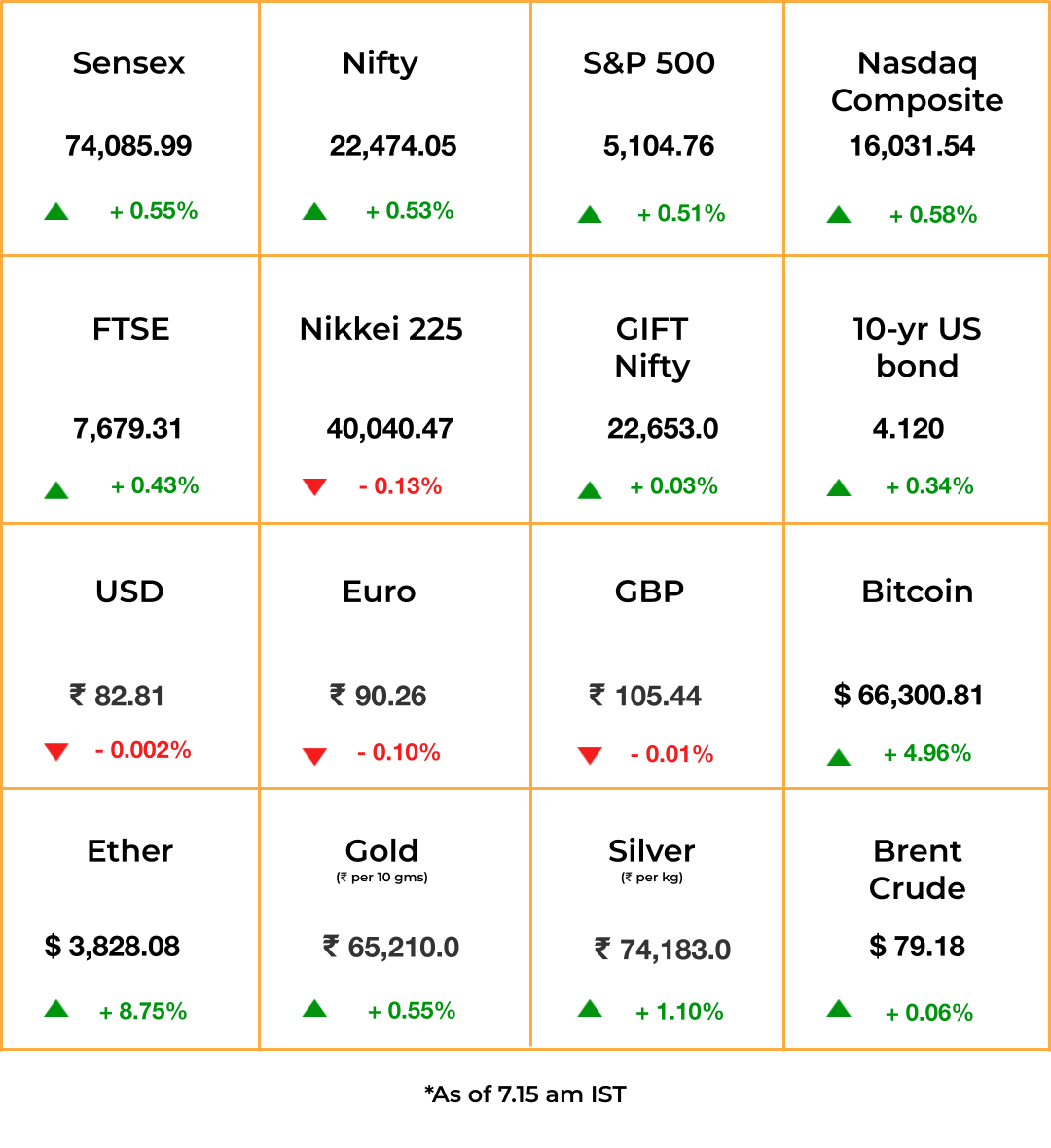Tata wants to divide and conquer
Also in today’s edition: Prachanda's ping-pong; IPO funding may dry up; Microsoft shifts gaming priorities; New headache for Big Pharma
Good morning! Grindr, the gay dating app, is looking to reinvent itself. As per Financial Times, it’s looking at long-term dating, travel, and professional networking as part of its new ‘appeal’. After a bout of restructuring, Grindr has managed to financially outperform rivals Match and Bumble. The company’s CEO, George Arison, apparently found inspiration from Uber’s pivot to food delivery for this new direction. Not sure if Uber, a company that’s allegedly violated regulations in several countries, is an ideal inspiration but well… to each their own.
🎧 The McCheese debate. Also in today’s edition: a conversation with antitrust lawyer Dinoo Muthappa about app store dominance. Tune in to The Signal Daily on Spotify, Apple Podcasts, Amazon Music, Google Podcasts, or wherever you get your podcasts.
Jessica Jani, Anup Semwal, and Roshni Nair also contributed to today’s edition.
The Market Signal*
Stocks & Economy: Reserve Bank of India governor Shaktikanta Das said in an interview that the central bank now expects India’s GDP to grow faster this year than earlier expected. Das said there is better visibility now on economic activity in the first three quarters and that makes the bank think output growth could be as high as 8%.
The RBI’s internal surveys showed that capacity utilisation (CU) was “very high”, although Das did not specify the level. Factories had cranked up production in the January-March quarter of 2023, taking CU up to 76.3%. Activity slowed thereafter, bringing CU down to 73.6% in the next quarter, and again inched up to 74% in July-September.
US rate cuts are on the cards but only if inflation stays low, Fed chair Jerome Powell said. Asian markets, except China, were up in morning trade. The GIFT Nifty indicates a positive start for Indian equities.
AUTOMOBILES
Doing The Splits
Tata Motors is demerging its commercial vehicle and passenger vehicle (PV) businesses. The company called this a “logical progression”: the businesses have had separate CEOs since 2021 and were later subsidiarised.
Opportune time: Tata’s PV business, which includes traditional passenger cars, electric vehicles (EVs), and luxury cars under the Jaguar-Land Rover division, is on an upswing. The demerger underlines Tata’s confidence in the PV segment’s ability to stand alone.
With this, Tata is expected to shift its focus to the competition, be it Maruti or Hyundai. It beat the latter in February to snag second place in India’s passenger car sales.This will also allow the company to accelerate its electric transition, where it enjoys a 72% market share in EVs. With the government pushing for more EVs (the Economic Advisory Council proposed a mandate for auto manufacturers to make a certain percentage of EVs), Tata is right on course.
NEIGHBOURHOOD
Left High And Dry
Nepal PM Pushpa Kamal Dahal ‘Prachanda’ has changed allegiances for the third time within one-and-a-half years.
Gist: In December 2022, the CPN-MC (Communist Party of Nepal-Maoist Centre) leader became PM with the backing of the Nepali Congress and the CPN-UML (Communist Party of Nepal-United Marxist-Leninist). But things fell apart between the Communists and Marxist-Leninists. Now, Prachanda has ditched the Nepali Congress and rejoined hands with the CPN-UML.
Why should I care?: The China angle, or so India would believe. Beijing long championed a Left alliance between the CPN-MC and CPN-UML, something Nepali Congress leaders have alluded to.
India is watching the new political developments in Nepal closely. In January, the Himalayan country and China underlined that they’d sign the long-pending implementation plan of the Belt and Road Initiative—never mind their differences over the debt-ridden Pokhara Airport.
BANKING
Rage Of Regulators

Indian regulators are widening their crackdown on errant companies. The Reserve Bank of India has asked Mumbai-based financial services company JM Financial to stop lending against shares and bonds as well as arranging financing for investors participating in public share sales.
Why?: The RBI said the non-banking finance company was effectively both buyer and seller in many transactions as it was operating with power of attorney and blanket sign-offs, which allowed it to operate on clients’ behalf without them even knowing about it.
Last month, market regulator Sebi had revealed that it had found early evidence of companies and underwriters inflating share sale application numbers and was probing further.
Others too: A couple of days ago, the central bank had cracked the whip on IIFL Finance, asking it to stop gold loans. It found irregularities in assessment and pricing, and violation of gold loan norms.
The RBI shook up the fintech sector in February when it asked Paytm Payments Bank to stop doing business.
The Signal
Banking commentator Tamal Bandopadhyay told The Core that the RBI under Shaktikanta Das wants such practices to be nipped in the bud. Be it banks, NBFCs, or gold loan companies, these are systemic issues.
It’s not that the RBI has acted arbitrarily. In all cases, the RBI has had back and forth communication with the managements for months and given them enough chances to rectify the violations. In some cases, however, the founders have been plain arrogant and standoffish.
GAMING
Moving On To Other Pastures
Microsoft is stepping back from the console market, the Financial Times reports.
The company is gradually making this transition by prioritising cloud-gaming, becoming more platform agnostic in the process. In doing so, the console wars would once again be fought between Japanese conglomerates, as it was until the ‘90s.
No worries: Xbox loyalists have nothing to worry about in the short term. During Microsoft’s face-off against the US FTC, it was revealed that the company planned to redesign its Xbox offerings. That includes a new disc-less Series X, a 2028 Xbox with “cloud hybrid games”, and a new controller. Meaning, despite declining sales, Xbox isn’t going anywhere just yet.
However: During the course of the FTC’s antitrust investigation into the Microsoft-Activision deal, a ‘leaked’ email by Microsoft’s gaming CEO, Phil Spencer, disclosed his desire to buy Nintendo. Clearly, there are several possibilities left in the console market.
PHARMACEUTICALS
The Fill-Finish Conundrum
Skyrocketing demand for weight-loss drugs may make Novo Nordisk (NN) and Eli Lilly the first pharma companies to hit a trillion-dollar market cap. For that to happen, the two must supersize production of their drugs, and fast.
Fill and finish: Neither drugmaker has enough factories specialising in filling drugs into syringes, a process called “fill-finish”. It’s a critical issue since their blockbuster drugs, Wegovy and Zepbound, are administered via injections.
What’s the fix?: Outsourcing to contract manufacturers. Per the Financial Times, Lilly inked deals with National Resilience and BSP Pharmaceuticals to ramp up fill-finish. Last month, NN’s parent company acquired contractor Catalent for $16.5 billion and got control of its fill-finish plants.
Oral pills could address fill-finish and cold chain issues, which is why competitors like Pfizer are eyeing the space. But challenges abound here too. NN's oral pill requires 146 times more active ingredients than the injectable variant.
FYI
Yet another bond sale?: Bloomberg reports that the Adani Group may offer $1.2 billion in dollar bonds by June for Adani Green Energy and associated firms. The conglomerate’s recent $409 million bond offer was oversubscribed seven times.
End of the road: Nikki Haley ended her run as the Republican presidential candidate for the US elections this year, paving the way for a Trump-Biden rematch.
One’s loss, another’s gain: The value of UPI payments on Paytm fell 14% to ~$20 billion from January 2024 following RBI curbs, NPCI data reveals; the value of transactions processed by PhonePe and Google Pay rose by 7% and 6%, respectively.
Aiming high: Ratings agency Crisil forecasts that India’s GDP will expand by 6.8% in the next fiscal, keeping the country on track to attain upper-middle income status by 2031.
Ugly beauty: US-based independent laboratory Valisure has found high traces of benzene, a carcinogen, in acne treatment products such as Estee Lauder’s Clinique and Reckitt Benckiser’s Clearasil. Valisure has petitioned the US FDA to recall the products.
Petty: The Apple-Epic Games saga has taken a new turn after Apple terminated Epic’s developer account, effectively killing the Fortnite developer’s plan to launch its own third-party App Store in the EU.
Eyes on the prize: BYD, the world’s largest EV maker, is focusing on “consolidating its leadership position” in India’s ₹30 lakh-plus ($36,213-plus) luxury EV segment, The Economic Times reports.
THE DAILY DIGIT
$2.79 billion
The decline in Meta chief Mark Zuckerberg’s net worth following the hour-long global outage of Instagram and Facebook on Tuesday. (India Today)
FWIW
Bad blood: Taylor Swift’s latest concert in Singapore has left a foul taste in the mouth of its neighbours. The island nation had struck a deal with Swift that mandated Singapore as the sole destination in Southeast Asia for her concerts in lieu of certain ‘grants’ for the performance. Several high-profile public officials in the region called the move ‘unfriendly’, including Thailand’s Prime Minister. His Singaporean counterpart has accepted the existence of such a deal while maintaining that there was no malice in their intention. Let’s hope that this doesn’t turn into a cruel summer for Singapore.
Matter of technicality: A proposal to declare a new geological epoch as the Anthropocene has been rejected by the members of the Sub-commission on Quaternary Stratigraphy, part of the International Union of Geological Sciences. The proposal was aimed at recognising the colossal impact of humanity on earth’s climate. While most scientists on the commission agree about said impact, they weren’t sure whether enough time has passed to justify terming it an ‘epoch’. If scientists can’t agree on something as simple as this, what hope do mere mortals like us have?
Condiment attack: Eating leftovers for dinner tonight? Don’t worry, you can spice it up with a sauce. How about pairing up your boring old bread with soda? Yup, there’s a sauce for that too. FMCG majors in the US are bombarding consumers with condiments because apparently, they can’t get enough of it. Companies like Kraft Heinz are capitalising on this perceived craze with snazzy marketing, dropping limited edition flavours like yuzu wasabi and customisable sauce dispensers for restaurants. Other companies are partnering with luxe brands like Truff and in the case of Burt’s Bees, a ranch-flavoured lip balm. God bless America!









